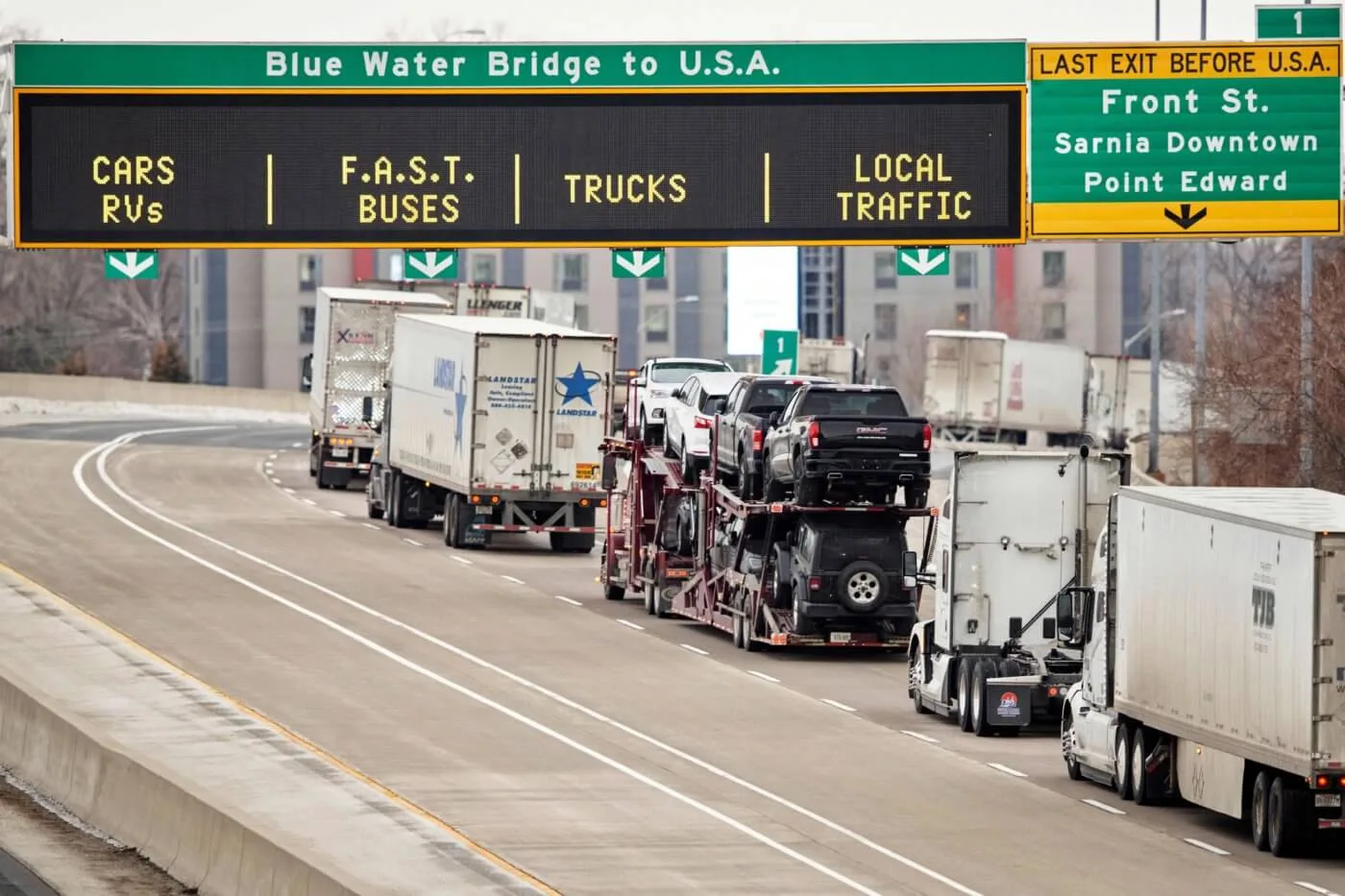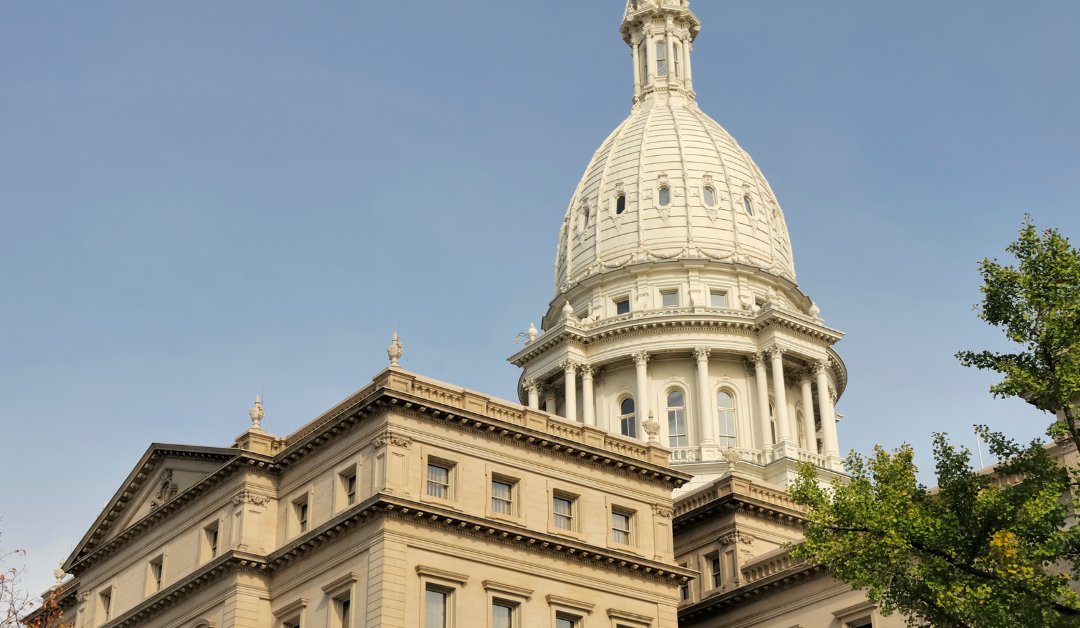
A long line of trucks waits on Highway 402 to cross into the United States at the Bluewater Bridge in Sarnia, Ontario on February 10, 2022. - The Canadian trucker protest has temporarily sidelined a key auto industry transport route, adding stress to a North American car industry already pinched by low inventories and supply chain problems that have sent vehicle price soaring. (Photo by Geoff Robins / AFP) (Photo by GEOFF ROBINS/AFP via Getty Images)
“The blockade is having a significant impact on Michigan’s working families who are just trying to do their jobs,” Gov. Gretchen Whitmer said in a statement. “Our communities and automotive, manufacturing, and agriculture businesses are feeling the effects. It’s hitting paychecks and production lines. That is unacceptable.”
Need to Know
- Truckers and right-wing, anti-vaccine protesters in Canada are blocking the Ambassador and Blue Water bridges, disrupting the flow of supplies to Michigan auto plants and forcing them to close.
- General Motors, Ford, and Toyota have all had to shut down some operations this week, harming Michigan’s workers and economy.
- The Biden administration has called on Canada to use federal powers to end the blockade and restore order, but Prime Minister Justin Trudeau has resisted, instead delegating to local authorities.
MICHIGAN—Local auto workers could lose as much as $51 million in wages this week due to blockades of the US-Canada border by truck drivers protesting a Canadian vaccine mandate, according to the Anderson Economic Group, a Lansing-based company that specializes in auto industry analysis.
What began three weeks ago as a small blockade in Ottawa has since spread and grown, with truck drivers and far-right, anti-vaccine protestors disrupting daily life in other Canadian cities. They’ve parked their trucks in the middle of intersections, blocking traffic and bringing daily life to a standstill as they demand the end of pandemic protections and the resignation of Canada Prime Minister Justin Trudeau.
The deeply unpopular group has also blocked the Blue Water and Ambassador bridges, causing miles-long backups and wreaking havoc on the ability of auto plants on both sides of the border to stay open.
The Ambassador bridge blockade has proven especially harmful, as it accounts for about a quarter of the trade between the US and Canada. Every day, about 10,000 trucks transport an estimated $325 million worth of goods across the bridge—about $50 million of which is automotive parts, according to the Michigan Department of Treasury.
Several auto plants in Canada have had to close, affecting the ability of factories in Michigan to remain operational. General Motors, Ford, and Toyota have all had to shut down some operations this week in places like Lansing and Delta Township because the blockades meant the plants were unable to get parts manufactured in Canada.
The calculation of lost wages also considers the impact on suppliers and transit workers, many of whom are hourly wage earners.
“This is a serious disruption with significant human impacts,” said Patrick Anderson, CEO of Anderson Economic Group. “With the industry already short-handed and production lines awaiting parts, any further interruption is very costly.”
Michigan Gov. Gretchen Whitmer on Thursday urged Canadian authorities to resolve the issue and end the blockades of the Ambassador and Blue Water Bridges.
“The blockade is having a significant impact on Michigan’s working families who are just trying to do their jobs,” Whitmer said in a statement. “Our communities and automotive, manufacturing, and agriculture businesses are feeling the effects. It’s hitting paychecks and production lines. That is unacceptable.”
RELATED: Charging on the Go: Michigan Building Innovative Electrified Road to Power Electric Vehicles While Driving
On Friday, Whitmer said she had been speaking to the White House, the Canadian ambassador, and Canadian leadership to try to resolve the crisis swiftly.
The disruption will likely affect other industries as well. The Biden administration is monitoring the blockade’s possible impact on agricultural exports to Canada.
“The President is focused on this,” White House Press Secretary Jen Psaki said on Wednesday. “And we are working very closely with the team at DHS, with Canadian officials, and others to do everything we can to alleviate the impact.”
The Biden administration has called on Trudeau to use federal powers to end the blockade and restore order, but the prime minister has thus far resisted, instead delegating to local authorities. In the face of that deference, the protests have only grown and are now causing harm to Michiganders and the economy.
Such disruption, of course, is exactly what the right-wing protesters want. Their aim is to disrupt daily life and hurt the economy in order to force Canadian officials to roll back pandemic-related public health rules.
Congresswoman Elissa Slotkin, a Michigan Democrat, said the blockade showed the consequences of outsourcing too much manufacturing.
“It doesn’t matter if it’s an adversary or an ally—we can’t be this reliant on parts coming from foreign countries,” she wrote in a series of tweets. “We have to bring American manufacturing back home to states like Michigan. If we don’t, it’s American workers like the folks at Delta Township who are left holding the bag.”
The convoy’s ability to paralyze the economy and affect daily life has drawn the praise of many Republicans in the US, including former President Donald Trump, as well as extremist groups and white supremacists. Far-right organizers are now discussing a similar convoy in the US, perhaps beginning as early as this Sunday at the Super Bowl in Los Angeles.
JOIN THE CONVERSATION: Sign up for our newsletter
Politics

It’s official: Your boss has to give you time off to recover from childbirth or get an abortion
Originally published by The 19th In what could be a groundbreaking shift in American workplaces, most employees across the country will now have...

Michigan Dems win special elections to regain full control of state government
LANSING—Democrats won back a majority in the Michigan House and restored their party's full control of state government Tuesday thanks to victories...

Trump says he’s pro-worker. His record says otherwise.
During his time on the campaign trail, Donald Trump has sought to refashion his record and image as being a pro-worker candidate—one that wants to...
Local News

That one time in Michigan: When we became the Wolverine State
How did Michigan become tied to an animal that's practically nonexistent there? Among the many nicknames that the state of Michigan has, arguably...

Readers’ Choice: Top 5 Bowling Spots in Michigan
From retro lanes — including one of the oldest running bowling alleys in the country — to modern entertainment centers, there's something for...





